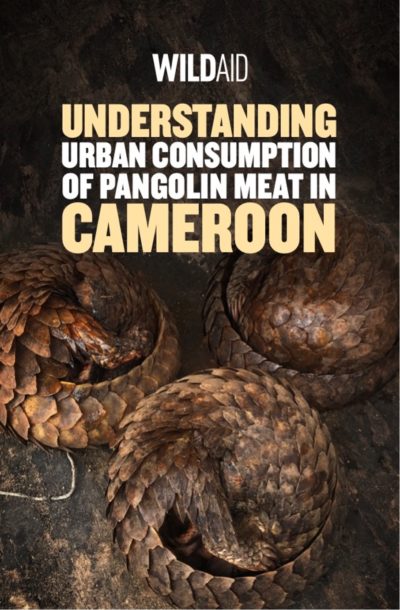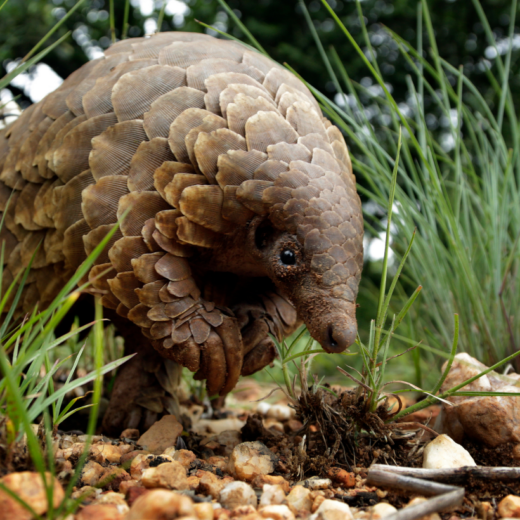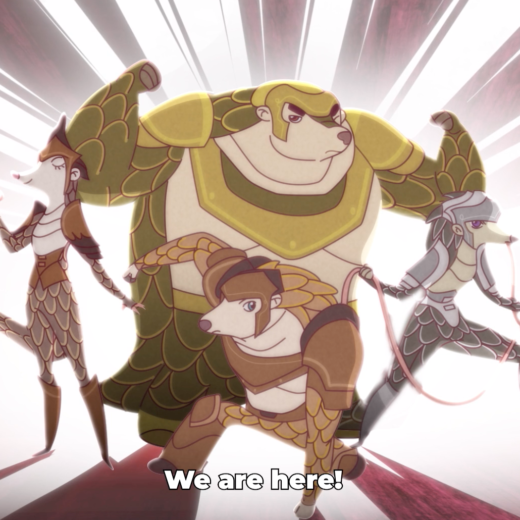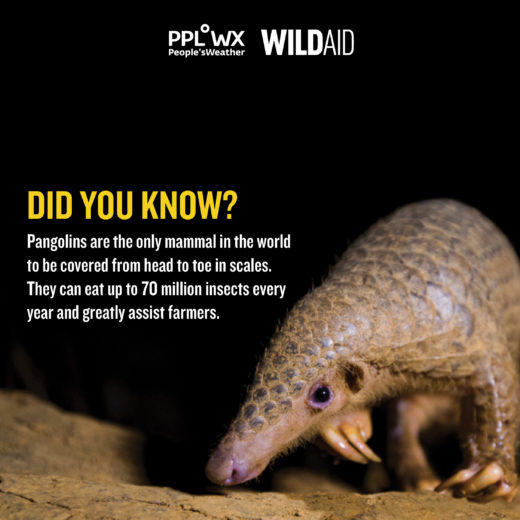
Influential voices from football and music hope to inspire protection of endangered pangolin.
Yaoundé, Cameroon – February 18, 2022 – WildAid launched a major public awareness campaign aimed at protecting the endangered pangolin on the eve of World Pangolin Day in partnership with the Ministry of Forests and Wildlife (MINFOF) and the Ministry of Sport and Physical Education (MINSEP).
The campaign highlights their illegal and unsustainable use in the bushmeat trade and the risks of zoonotic disease transmission. Results of two new public attitudinal surveys were also released, which underscore the high level of bushmeat consumption and low awareness of laws protecting pangolins, along with high levels of pride for Cameroon’s forests and rich natural heritage.
Three species of pangolin are found in Cameroon’s lush rainforests, but all are threatened with extinction. The most trafficked mammal across the world, pangolin is also commonly found in local bushmeat markets.
Under the slogan “Say NO to pangolin meat”, the campaign aims to raise awareness of pangolins’ valuable role in maintaining a healthy environment. It stresses the key role that Cameroon can play in protecting pangolins and shows how the country can become a leader in African conservation.
Football legends Rigobert Song, Roger Milla and Patrick Mboma are backing the campaign, along with leading musicians Stanley Enouw and LOCKO, and visual artist Toh Bright. Together, they hope to inspire Cameroonians to protect the country’s incredible wildlife for future generations
“Pangolins have few natural predators and only have one baby about every 18 months. Illegal commercial bushmeat trade use can quickly reduce their number and threaten them with extinction. Traders note the animals are getting harder to find,” said WildAid President, Peter Knights OBE.
“If it is to expand eco-tourism as the government is planning, Cameroon needs to protect its incredible biodiversity. Stopping illegal bushmeat trade also protects people from zoonotic and parasite-borne disease,” he added.
Cameroon’s Minister for Forests and Wildlife, Jules Doret Ndongo, said the pangolin was of “paramount importance for our environment,” mixing and aerating the soil as it digs for ants and termites and aiding the decomposition cycle that is vital for the country’s lush vegetation.
“In addition to being a beautiful and intriguing animal, the pangolin has a distinct ecological role,” he said, talking of the need “to change the vast majority of the population from the status of consumer of the pangolin, to that of protector.”
“It is also about making people aware of the value of our natural resources and being able to get support for their conservation,” he added.
On Jan. 6, WildAid launched a similar campaign against the illegal bushmeat trade in Nigeria backed by wildlife ambassadors from music, Nollywood, sports, religion, and entertainment, including Afrobeats stars Davido and Mayorkun, and Everton FC and Nigeria footballer Alex Iwobi.
Pangolins, also known as scaly anteaters, are reclusive and nocturnal animals that roll up into a ball when threatened. They are seldom seen in the wild, only give birth to a single offspring at a time and are very hard to raise in captivity.
Anywhere from 100,000 to more than 2.5 million pangolins are taken from the wild every year across Africa and Asia, and populations of all eight species of pangolin are plummeting towards extinction. Cameroon is a key habitat for three species: the giant pangolin, the white-bellied pangolin and the black-bellied pangolin, but all face growing threats from poaching, deforestation and habitat loss.
In 2017, countries voted overwhelmingly to ban international trade in all eight pangolin species, under the Convention on International Trade in Endangered Species of Wild Fauna and Flora, also known as CITES. The government of Cameroon followed that decision by banning the hunting, capture, killing and trade of all pangolin species within the country, as well as all international trade.
Yet consumption of pangolin meat and other illegal forms of bushmeat remains widespread in Cameroon cities. A survey by WildAid and the Central African Bushmeat Action Group found that pangolin was the second most frequently consumed form of bushmeat after porcupine, with 49 percent of bushmeat consumers in the cities of Douala and Mbalmayo saying they had consumed pangolin in the past 12 months.
Before launching this campaign, WildAid also conducted a second survey among the general public in five cities in Cameroon. It found that awareness of the 2017 law protecting pangolins was very low. Only 29% of respondents knew it was illegal to kill and trade all species of pangolin. An overwhelming majority (93%) were proud that pangolins exist in Cameroon. But many people are unaware of threats facing pangolins or the role they play in maintaining a healthy environment.
Attitudes towards wildlife in Cameroon were also very positive: Very strong majorities said wildlife is important for Cameroon’s natural heritage (92%), said they were proud of Cameroon’s wildlife (87%), and said wildlife provides valuable income through tourism (89%). Another large majority (83%) said they would pay money to visit a national park here, a finding that will support the government’s efforts to expand domestic tourism. There was also strong agreement that Cameroon should ban the hunting of endangered wildlife, and strong concern over deforestation.
“It’s really encouraging to see how much pride Cameroonians have in their incredible wildlife, and in pangolins specifically,” said Simon Denyer, a senior consultant with WildAid. “People here have lived in balance with nature for countless generations, and it is really important to restore that natural balance before it’s too late.”
Under the slogan “Keep Them Wild, Keep Us Safe,” the campaign also aims to raise awareness of the health risks of the illegal bushmeat trade in spreading dangerous zoonotic diseases, such as HIV, Ebola, SARS, Lassa fever, monkeypox and COVID-19.
Previous WildAid campaigns have contributed to an 80% reduction of shark fin imports to China and 75%+ reductions in the price of ivory and rhino horn in Asia.
WildAid also launched a public awareness campaign in China and Vietnam in 2016 aiming to eliminate demand for pangolin scales in the world’s two largest markets. Enlisting the power of ambassadors like Jackie Chan and Angelababy, we have reached 800 million viewers across dozens of TV networks and on 160,000 video screens in subways, airports, bus stops, and shopping centers.
Download the report: UNDERSTANDING URBAN CONSUMPTION OF PANGOLIN MEAT IN CAMEROON
Download the report: ATTITUDES TOWARDS PANGOLINS AND WILDLIFE AMONG THE GENERAL PUBLIC IN URBAN CAMEROON
For media inquiries please contact:
WildAid U.S.
Peter Knights, Founder and President
Phone +1-415-254 3174
knights@wildaid.org
WildAid Cameroon
Jennifer Biffot, Francophone Africa Representative
Phone (+237) 693 885 423
biffot@wildaid.org
About WildAid
WildAid is a non-profit organization with a mission to end the illegal wildlife trade in our lifetimes. While most wildlife conservation groups focus on protecting animals from poaching, WildAid primarily works to reduce global consumption of wildlife products such as elephant ivory, rhino horn and shark fin soup. With an unrivaled portfolio of celebrity ambassadors and a global network of media partners, WildAid leverages more than $218 million in annual pro-bono media support with a simple message: “When the Buying Stops, the Killing Can Too”.
WildAid in Africa
Since 2015, WildAid has been working in Cameroon, Gabon, Mozambique, Nigeria, South Africa, Tanzania, Uganda, and Zimbabwe to highlight the urgency in protecting wildlife. Using celebrity ambassadors, from singers and athletes to ministers and religious leaders, we aim to reach the hearts and minds of the public at all levels of society, under the taglines “Poaching Steals from Us All” and “Keep Them Wild, Keep Us Safe.”
More information on WildAid’s work in Africa can be found at https://jointheherd.net
Follow us on social media @wildaidafrica (Facebook, Instagram, Twitter, TikTok, YouTube).
Stay in touch and get the latest WildAid updates.
SIGN UPAbout WildAid
WildAid is a non-profit organization with a mission to protect wildlife from illegal trade and other imminent threats. While most wildlife conservation groups focus on protecting animals from poaching, WildAid primarily works to reduce global consumption of wildlife products such as elephant ivory, rhino horn and shark fin soup. With an unrivaled portfolio of celebrity ambassadors and a global network of media partners, WildAid leverages more than $308 million in annual pro-bono media support with a simple message: When the Buying Stops, the Killing Can Too.
Journalists on deadline may email communications@wildaid.org


